

4 Essential Rules Of 21st Century Learning. 4 Essential Rules Of 21st Century Learning by Jennifer Rita Nichols The term “21st century” has become an integral part of educational thinking and planning for the future.
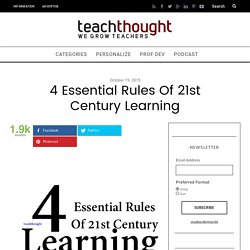
Educators and administrators are actively searching for ways to prepare students for the future, and the educational system has been evolving faster than ever before. Various studies have shown us that rote memorization is not an effective learning strategy, and that teacher-centered classrooms may not be the most efficiently structured ones for student engagement. However, despite learning about the skills that students will need to develop to become successful in the 21st century, as well as what beliefs about education may be worth hanging onto or throwing away, schools and teachers are left trying to figure out what their role needs to be in the education of their 21st century students.
15,000+ Hours of Free Video & Audio Lectures from World-Class Universities. The 20 Best Learning Management Systems. How To Use Mood Boards For Visual Learning 2.28K Views 0 Likes Mood boards are used for photography, game design, interior design, marketing, fashion, music, advertising and even architecture; but who’s to say they shouldn’t be used in the classroom? (You might be doing this already!) 7 Online Quiz Tools Perfect For Classrooms. A Free Search Engine for Learning. MOOCs are here. How should state universities respond? Here is a short essay on MOOCs that Drs.
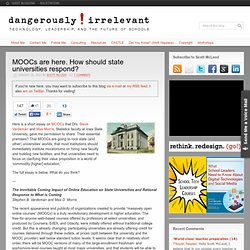
Experiences from Massive Open Online Courses (MOOCs) and how the MOOC could potentially increase diversity, social inclusion & learner engagement. There is currently much interest and excitement at the emergence of an educational approach commonly termed the ‘Massive Open Online Course’ or MOOC.
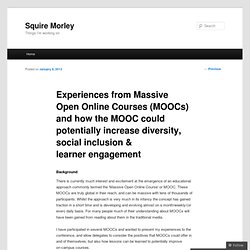
These MOOCs are truly global in their reach, and can be massive with tens of thousands of participants. Tom Vander Ark: Canvas.net Shifts The MOOC Model Paradigms. Khan Academy. 5 Ways edX Could Change Education. After the initial announcement of Harvard and MIT’s collaborative learning platform, edX, earlier this year, I speculated that it might have several things to teach the world about e-learning and education in general. The possible research contributions of edX to education that I proposed at the time were: students like learning with technology; gamification works; peer-enabled learning is effective; time should be a variable in learning not a constant; and that teaching innovation isn’t easy.
Chronicle reporter Marc Parry recently visited the edX office on the MIT campus and uncovered the actual facts behind the developing research agenda at edX. Here is a look at what the researchers at MIT and Harvard intend to investigate and an evaluation of the evolving edX agenda. 1. Engaging Alumni in New Ways In one MIT computer science class, there were so many participants and code to evaluate, that instructors simply could not keep up with the workload.
Online Education Is Replacing Physical Colleges At A Crazy Fast Pace. Educators knew the online revolution would eventually envelop the physical classroom, but a torrent of near-revolutionary developments in the past month are proving that change is coming quicker than anyone imagined.
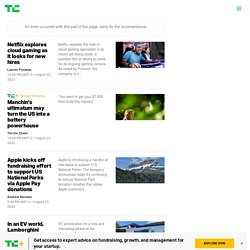
In just 30 days, the largest school system in the U.S. began offering credit for online courses, a major university began awarding degrees without any class time required, and scores of public universities are moving their courses online. The point at which online higher education becomes mainstream is no longer in some fuzzy hypothetical future; the next president’s Secretary of Education will need an entire department dedicated to the massive transition. For over a decade, admissions-selective universities (e.g. not the University of Phoenix) resisted giving credit for their overwhelmingly popular online courses. I was wrong about one thing: the otherwise scientifically prudent community of higher education didn’t wait to see if the pilot was successful.
Online Education. UPDATE: we're doing a live, updated MOOC of this course at stanford-online July-2014 (not this Coursera version).
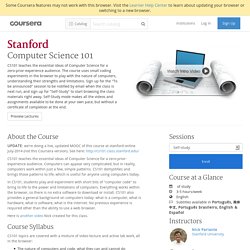
See here: CS101 teaches the essential ideas of Computer Science for a zero-prior-experience audience. Computers can appear very complicated, but in reality, computers work within just a few, simple patterns. How are MOOCs organized? A real-time chronicle of a seasoned professor who is about to give his second massively open online course.
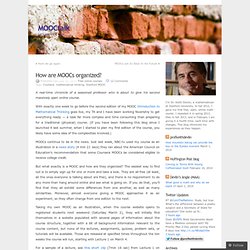
With exactly one week to go before the second edition of my MOOC Introduction to Mathematical Thinking goes live, my TA and I have been working feverishly to get everything ready — a task far more complex and time consuming than preparing for a traditional (physical) course. (If you have been following this blog since I launched it last summer, when I started to plan my first edition of the course, you likely have some idea of the complexities involved.) MOOCs continue to be in the news. Just last week, NBC-tv used my course as an illustration in a news story (4 min 21 secs) they ran about the American Council on Education’s recommendation that some Coursera MOOCs be considered eligible to receive college credit. A School in the Cloud and the Future of Learning. Sugata Mitra, TED 2013.
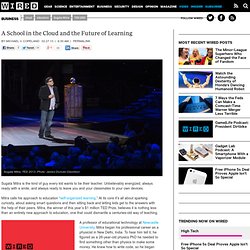
Photo: James Duncan Davidson Sugata Mitra is the kind of guy every kid wants to be their teacher. Unbelievably energized, always ready with a smile, and always ready to leave you and your classmates to your own devices. Mitra calls his approach to education “self-organized learning.” Pedagogical & mLearning MOOC platform - the approach. For all of you out there wanting to push your government into setting up a Massive Open Online Course (MOOC) platform gathering knowledge from all your national universities, take a look at the approach of UK’s open university on planning a MOOC platform, it looks very promising.
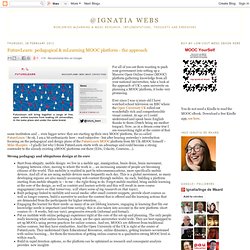
Ever since I was 9 years old I have watched school television on BBC where the Open University UK rolled out wonderfully rich and comprehensible visual content. At age 10 I could understand and speak basic English thanks to them (Dutch being my mother tongue).